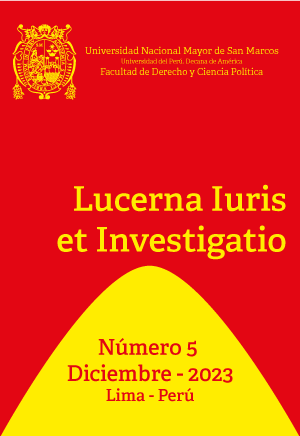Legal implications of ubiquitous neurotechnology and artificial intelligence in the Fourth Industrial Revolution: emerging neurorights
DOI:
https://doi.org/10.15381/lucerna.n5.26950Keywords:
emerging neurorights, Fourth Industrial Revolution, ubiquitous neurotechnology, Industry 4.0, artificial intelligence, neurorevolution, neurospecific rightsAbstract
The Fourth Industrial Revolution is giving rise to legal implications of various kinds, however the one generated by the combination of ubiquitous neurotechnology and artificial intelligence is more transcendental, since this neurorevolution by enabling the extraclinical exploitation of brain data poses challenges for human rights, since that expose individuals to intrusion into the most intimate aspects of their private lives, the risk of having their data hacked, interference with confidentiality and digital surveillance. Therefore, in the context of Industry 4.0 or Industrial Revolution Stage Four, the need to guarantee emerging neurorights related to cognitive freedom, mental privacy, mental integrity and psychological continuity through specific regulations is evident. Furthermore, the consolidation of such neurospecific rights or rights of the mind is a recommendation of specialized academia and a concern of human rights organizations, which must be addressed before it is too late.
Downloads
Published
Issue
Section
License
Copyright (c) 2023 Wilder Luis Charaja Bejar

This work is licensed under a Creative Commons Attribution 4.0 International License.
THE AUTHORS RETAIN THEIR RIGHTS:
- The authors retain their rights to the work, trademark and patent, and also to any process or procedure described in the article.
- The authors retain the right to share, copy, distribute, execute and publicly communicate the article published in Lucerna Iuris et Investigatio (for example, place it in an institutional repository or publish it in a book), with an acknowledgment of its initial publication in Lucerna Iuris et Investigatio .
- The authors retain the right to make a subsequent publication of their work, to use the article or any part of it (for example: a compilation of their work, conference notes, thesis, or part of a book), provided that indicate the source of publication (authors of the work, journal, volume, number and date).






